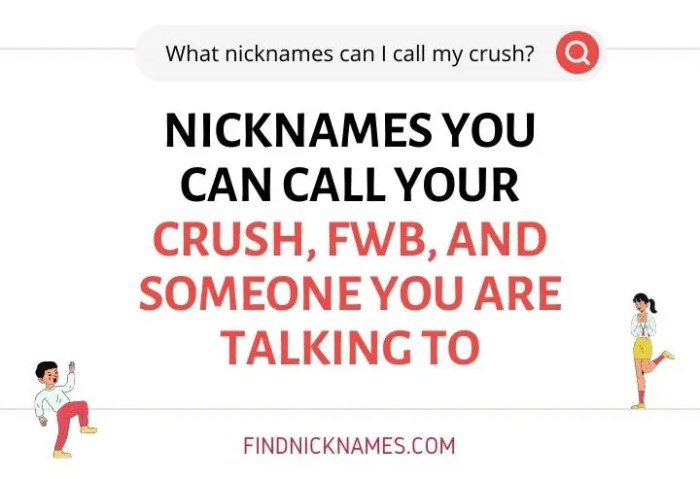Cute Names to Call Your Crush is your ultimate guide to finding the perfect pet names for your special someone. We’ll explore a variety of approaches, from sweet and adorable nicknames to funny and playful ones, unique and creative names, and even considering your crush’s personality. We’ll also delve into the nuances of using nicknames in conversation, avoiding awkward ones, and how cultural backgrounds can influence your choices.
Get ready to discover the best way to express your affection!
This comprehensive guide covers various aspects of choosing the perfect nickname, considering personality types, and cultural sensitivities. We’ll provide examples, scenarios, and practical advice to help you navigate this important part of building a connection with your crush.
Sweet & Adorable Nicknames
Choosing the right nickname for your crush can be a delightful way to express affection and deepen your connection. It’s a personalized touch that speaks volumes about your feelings and the unique bond you share. Finding the perfect moniker often involves considering their personality, your shared history, and the specific nuances of your relationship.Finding the perfect nickname is more than just a cute label; it’s a reflection of your understanding of your crush’s personality and your shared experiences.
The right nickname can strengthen your bond, fostering a sense of intimacy and playfulness.
Sweet & Adorable Nicknames by Personality Traits
This categorization helps you select a nickname that resonates with your crush’s specific characteristics. Matching a nickname to their personality adds a personal touch and reinforces your connection.
| Nickname | Personality Trait | Connotation |
|---|---|---|
| Sunshine | Playful | Suggests a cheerful and optimistic disposition. |
| Spark | Playful | Captures a sense of energy and enthusiasm. |
| Sweetpea | Thoughtful | Evokes a gentle and endearing image. |
| Dreamer | Thoughtful | Highlights a romantic and imaginative nature. |
| Buttercup | Shy | Implies a delicate and sweet-natured individual. |
| Moonbeam | Shy | Suggests a gentle and introspective character. |
| Honey | Warm & Affectionate | A classic term of endearment, conveying warmth and sweetness. |
| Lovebug | Warm & Affectionate | A playful term signifying affection and a fondness for closeness. |
| Starlight | Mysterious | A captivating and enchanting moniker, hinting at a sense of wonder. |
| Whispering Wind | Mysterious | Suggests a captivating and enigmatic personality. |
| Little Bear | Protective | A cuddly and comforting nickname, expressing a desire to nurture. |
| Tiny Turtle | Protective | Implies a calming and dependable nature, emphasizing patience and reliability. |
| Princess | Kind | A sweet and respectful term that embodies gentleness and kindness. |
| Angel | Kind | A classic term conveying a sense of purity and compassion. |
| Cinnamon Roll | Kind | Highlights a comforting and endearing quality, like the warmth of cinnamon. |
| Gentle Breeze | Kind | Evokes a sense of calmness and a gentle spirit. |
| Little Lion | Brave | A powerful nickname conveying strength and confidence. |
| Firefly | Brave | Captures a sense of boldness and brilliance. |
Nicknames Evoking Warmth and Affection
These nicknames are designed to convey a sense of comfort, care, and deep affection. They reflect a genuine appreciation for your crush.
- Love: A timeless and universal expression of affection.
- Sunshine: A cheerful and optimistic nickname, reflecting the warmth of your feelings.
- Sweetheart: A classic term of endearment that signifies affection and care.
- Honey: A sweet and intimate term that conveys warmth and sweetness.
- Dearest: A formal yet affectionate term, conveying deep care and admiration.
- My Love: A declaration of affection, expressing a deep connection.
- My Star: A romantic and poetic nickname, conveying admiration and a sense of wonder.
- My Everything: A powerful expression of devotion, emphasizing the importance of your crush in your life.
- My Darling: A sweet and affectionate term, conveying care and endearment.
- My Precious: A term expressing deep love and care, highlighting the value of your crush.
Cultural Influences on Nicknames
Different cultures have distinct traditions and customs surrounding nicknames. Cultural background significantly impacts the selection of cute nicknames. For example, some cultures might favor nicknames that reflect family heritage or historical figures, while others might prefer nicknames that evoke natural elements or spiritual concepts. Understanding these nuances can enhance the selection process. A thoughtful consideration of cultural background ensures the nickname resonates with your crush’s heritage and background.
Funny & Playful Nicknames

Adding a touch of humor to your interactions with your crush can significantly enhance your connection. Funny nicknames, based on inside jokes or shared interests, can create a playful and intimate dynamic, making your conversations more engaging and memorable. This approach fosters a deeper understanding and appreciation for each other’s personalities.Shared humor is a powerful tool in building rapport and strengthening a bond.
When you laugh together, you create a shared experience that transcends superficial interactions and fosters a genuine connection. The ability to find humor in everyday situations, and in each other, is a significant indicator of compatibility and a sign of a healthy relationship.
Generating Funny Nicknames
Finding the perfect funny nickname relies heavily on understanding your crush’s personality and your shared experiences. Think about inside jokes, inside puns, and common interests to create a unique and memorable moniker. This approach ensures the nickname is both funny and meaningful.
- The “Inside Joke” Nickname: These nicknames are based on a specific shared memory, inside joke, or inside pun that only the two of you understand. For example, if you both find the way your crush’s cat yawns hilarious, calling them “Yawny” might become a fun nickname.
- The “Shared Interest” Nickname: If you both love a particular band, TV show, or hobby, a nickname relating to that shared interest can be a great way to connect. For example, if you both love Star Wars, “Darth” or “Princess” might be appropriate.
- The “Observational” Nickname: Sometimes, a nickname can be derived from a recurring quirk or a characteristic that’s funny to you both. If your crush always mispronounces a word in a specific way, a nickname based on that could be a great way to connect.
Examples of Funny Nicknames
This table demonstrates the concept of funny nicknames based on inside jokes and shared interests.
| Nickname | Implied Humor | Suggested Situations |
|---|---|---|
| “Professor” (if your crush is a diligent student) | Playful reference to their studious nature | During study sessions, when discussing their studies |
| “The Architect” (if your crush is creative with building things) | Playful reference to their creative skills | When discussing a project, when they are sketching something, when they are showing you a model |
| “Zoom Zoom” (if your crush loves speed) | Playful reference to their enthusiasm for speed | When talking about sports, cars, or any activity involving speed |
| “The Picasso” (if your crush is a talented artist) | Playful reference to their artistic talent | During art classes, when discussing their art, when they are creating a piece of art |
| “Lightning Bolt” (if your crush is fast-paced) | Playful reference to their energy and speed | When talking about their daily activities, when they are moving quickly, when they are working on a project |
| “The Magnificent” (if your crush is impressive) | Playful reference to their impressive qualities | When discussing their accomplishments, when they are in a position of leadership |
| “Mr./Ms. [Something related to inside joke]” | Relates to an inside joke | In a humorous conversation, during a casual chat |
| “The [Character from a shared movie/show]” | Relates to a shared movie/show | When discussing the movie/show, when discussing similar situations |
| “The [Descriptive term relating to their appearance]” | Relates to a physical characteristic | During a playful conversation, when you’re in a humorous mood |
| “The [Shared interest/hobby]” | Relates to a shared hobby/interest | During discussions about shared interest/hobby |
| “Sleepyhead” (if they are known to sleep late) | Playful reference to their sleep schedule | During morning conversations, when you’re talking about their morning routine |
| “Smarty Pants” (if they are known to be quick-witted) | Playful reference to their intelligence | During discussions, when they answer a question quickly |
| “The [Animal that resembles a specific quality]” | Relates to their characteristics or behavior | When you want to use a playful nickname in a humorous context |
Humor is a powerful connector. It allows you to see your crush in a different light, fostering a more profound connection.
Unique & Creative Nicknames
Unleashing your inner poet to find the perfect nickname can be a surprisingly rewarding experience. It’s more than just a cute label; it’s a reflection of your connection, a whisper of inside jokes, and a playful way to express your affection. Choosing a unique nickname can add a special touch to your relationship and strengthen your bond.
Unique Nicknames: Creative Wordplay and Imagery
Finding a nickname that truly captures the essence of your crush requires a little creativity. Wordplay, metaphors, and imaginative imagery can transform a simple name into something truly special. Think about the qualities you admire in your crush, their personality quirks, or inside jokes you share.
- Starlight: Evokes a sense of wonder and brightness, suitable for someone with a captivating aura.
- Midnight Muse: Combines the mysterious allure of midnight with the creative spirit of a muse, perfect for a crush who inspires your imagination.
- Sunbeam: A warm and cheerful nickname, highlighting someone’s positive energy and radiant personality.
- Whisperwind: A delicate and evocative nickname, perfect for a quiet and thoughtful individual.
- Emberglow: A fiery nickname, suggesting passion and inner warmth, suitable for a person who exudes intensity.
- Lunar Lullaby: A dreamy and calming nickname, ideal for someone who has a soothing presence and a peaceful nature.
- Skyrocket: Captures ambition and drive, perfect for a person who’s always reaching for new heights.
- Silent Storm: A powerful nickname that speaks to a person’s hidden strength and intensity.
- Golden Hour: A nickname that highlights a crush’s captivating presence, especially during moments of beauty and warmth.
- Secret Garden: A mysterious and enchanting nickname, perfect for someone who has a hidden depth and a unique charm.
- Whispering Willow: A graceful and poetic nickname, highlighting a person’s quiet strength and calming presence.
- Cosmic Compass: A nickname that suggests a crush’s guidance and direction in life, suitable for someone who provides clarity and support.
- Morning Dewdrop: A fresh and delicate nickname, highlighting a crush’s youthful energy and charm.
- Midnight Mariner: A nickname that evokes adventure and exploration, perfect for a crush who’s always seeking new experiences.
- Diamond Dust: A nickname that hints at a person’s preciousness and unique sparkle.
Reflecting Personality Traits
A well-chosen nickname can reflect a specific aspect of your crush’s personality. Consider their hobbies, interests, or unique qualities.
| Nickname | Origin | Intended Meaning |
|---|---|---|
| Bookworm | Figurative | Reflects a love for reading and intellectual pursuits. |
| Techie | Informal | Highlights a crush’s proficiency in technology. |
| Artist | Descriptive | Captures a person’s artistic talent and creativity. |
| Adventurer | Descriptive | Emphasizes a crush’s adventurous spirit and love for exploration. |
| Chef | Descriptive | Reflects a crush’s culinary skills and passion for food. |
Incorporating Personal Experiences
Adding personal inside jokes or references can make a nickname even more meaningful and special.
“My crush, Sarah, always has a brilliant idea. So, ‘Spark’ became her nickname.”
These unique nicknames, when chosen thoughtfully, become a special way to connect with your crush on a deeper level. Remember, the best nickname is one that feels authentic and reflects your shared experiences and connection.
Considering Your Crush’s Personality
Choosing the right nickname for your crush is more than just picking a cute sound. It’s about reflecting their unique personality and making them feel comfortable and special. A well-chosen nickname can strengthen your connection and create a deeper bond. This process involves understanding your crush’s personality type and tailoring your nickname choices accordingly.Understanding your crush’s personality allows you to select a nickname that resonates with them and makes them feel appreciated.
This consideration is crucial for a positive and healthy relationship dynamic. By recognizing their individual traits, you can find a nickname that feels authentic and genuine.
Extroverted vs. Introverted
Extroverts often thrive in social settings and enjoy expressing themselves openly. Nicknames for extroverted crushes should reflect their outgoing nature. Consider names that are lively, playful, or even a little bold. “Spark,” “Leo,” or “Sunshine” might be good options. Introverted crushes, on the other hand, might prefer more reserved and thoughtful nicknames.
Names like “Whisper,” “Moonbeam,” or “Serene” could be more fitting, as they align with their introspective nature.
Artistic vs. Athletic
Artistic individuals often possess a creative spirit and a unique perspective. Nicknames for artistic crushes should highlight their creative flair. “Muse,” “Paintbrush,” or “Pixel” could work well. For athletic crushes, nicknames that reflect their active and energetic nature are a great choice. “Champion,” “Rocket,” or “Striker” could be excellent choices.
Remember to consider their specific athletic interests when making your selection.
Shy and Quiet Crush
Connecting with a shy and quiet crush requires a delicate approach. Their sensitivity and reserved nature need to be respected. Avoid nicknames that are too boisterous or loud. Instead, opt for soft, gentle, and comforting names. Some suitable nicknames for a shy, quiet crush include “Sweetpea,” “Moonbeam,” “Whisper,” “Cozy,” or “Little Star.” These nicknames convey warmth and appreciation without being overwhelming.
Tailoring Nicknames to Reflect Specific Qualities
Once you have a better understanding of your crush’s personality, you can tailor your nickname to reflect specific qualities that you admire. If your crush has a captivating smile, “Smiley” or “Sunshine” could be perfect. If they have a strong sense of humor, “Giggles” or “Funnybones” might be appropriate. Paying attention to specific details allows you to create a nickname that feels personal and unique.
Importance of Comfort Level
Ultimately, the most important factor in choosing a nickname is your crush’s comfort level. Avoid nicknames that feel forced or uncomfortable. Observe how your crush reacts to different terms of endearment. If they seem receptive to a particular nickname, it’s a good sign that it’s the right choice. If they seem uncomfortable or hesitant, it’s essential to respect their feelings and choose a different nickname.
A respectful and thoughtful approach is vital in maintaining a healthy and positive connection.
Using Nicknames in Conversation
Using a cute nickname for your crush can significantly enhance your connection and make conversations feel more personal and intimate. It’s a subtle way to show affection and create a warm, comfortable atmosphere. This approach fosters a sense of closeness and allows for a more natural flow in the interaction.Choosing the right nickname and using it appropriately can be a powerful tool in communication.
A well-placed nickname can create a special bond, demonstrating that you’re paying attention and that the other person is important to you.
Examples of Using Nicknames Naturally
Using nicknames in conversation requires sensitivity and awareness of the other person’s comfort level. It’s crucial to gauge their reaction and adjust your approach accordingly. A playful nickname used in the right context can be endearing, while the same nickname used inappropriately could be awkward or even offensive.
- Casual Conversation: “Hey, [Nickname], how’s your day going?” This is a simple, everyday use of a nickname. The key is to make it sound natural and not overly formal.
- Expressing Affection: “Oh, [Nickname], you’re looking absolutely stunning tonight!” This demonstrates a more affectionate tone. The context and tone are crucial here. The nickname emphasizes the speaker’s attention to the crush and their admiration.
- Playful Interactions: “Hey [Nickname], you’re such a goofball! I love it!” This example showcases a playful tone, appropriate in a relaxed setting. The nickname adds a touch of lightheartedness and warmth to the interaction.
- In a Group Setting: “Hey [Nickname], did you hear what [another person] said?” This is a useful approach in group settings, as it subtly draws attention to the person and creates a sense of inclusivity.
Scenario: A Dialogue with Nicknames
Amelia and Liam are enjoying a coffee date. The atmosphere is relaxed and friendly.
Liam: Hey [Amelia’s nickname], how are you doing today?
Amelia: Hey [Liam’s nickname], I’m doing great, thanks for asking. And you?
Liam: I’m fantastic! Just finished that new book I’ve been meaning to read. What about you?
Amelia: I’m so glad you enjoyed the book! I was just thinking about how you always have great taste in literature. What are you reading next?
Liam: Something completely different this time. A historical fiction novel. Want to hear about it?
Thinking of cute names for your crush? Sometimes, the perfect moniker just clicks, and you’re instantly transported to another world. This feeling is similar to hearing Frank Ocean’s “Thinking About You” reimagined by sbtrkt; this edit really captures that sweet, dreamy feeling. So, while you’re pondering the perfect moniker, remember to be genuine and let your personality shine through.
Maybe “Sunshine” or “Spark” works for you? The possibilities are endless!
Amelia: Absolutely! I love hearing about your new reading choices, [Nickname].
This dialogue demonstrates how a well-chosen nickname can make the conversation feel more intimate and personal. The nicknames “Amelia’s nickname” and “Liam’s nickname” are used in a natural and appropriate manner, enhancing the positive atmosphere and making the conversation flow smoothly.
Thinking of cute nicknames for your crush? It’s all about finding something sweet and endearing, right? While I’m brainstorming, let’s talk about something else totally unrelated: the Spoon extend world tour. If you’re a fan of their music, you absolutely need to check out their upcoming shows – details on the Spoon extend world tour are available online! Back to those sweet nicknames: maybe “Sunshine” or “Lovebug” would fit the bill?
Avoiding Awkward or Offensive Nicknames

Choosing the right nickname can significantly enhance your connection with your crush, but it’s crucial to avoid those that might unintentionally offend or create awkwardness. A well-chosen nickname shows thoughtfulness and respect, while an inappropriate one can damage the budding relationship. Consider the potential impact of your words before using them.Using nicknames, while meant to be endearing, can sometimes have unintended negative consequences.
It’s important to be mindful of cultural norms, personal preferences, and the overall tone of the relationship when selecting a nickname. The goal is to build a positive and comfortable atmosphere, not to create friction or confusion.
Potential Pitfalls of Inappropriate Nicknames
Using nicknames that are offensive, disrespectful, or inappropriate can quickly damage a budding relationship. Such nicknames can convey a lack of sensitivity, a disregard for the other person’s feelings, or a misunderstanding of social cues. They might even create a sense of discomfort or distrust. This can lead to a breakdown in communication and ultimately hinder the development of a healthy connection.
Nicknames that Might Be Considered Offensive or Disrespectful
Some nicknames, seemingly harmless, can be deeply offensive or disrespectful depending on the context and the individual. Avoid nicknames that rely on stereotypes, make fun of physical attributes, or reference personal insecurities.
- Nicknames based on physical traits that could be perceived as teasing or mocking, especially if they highlight perceived flaws or imperfections. For example, a nickname that alludes to someone’s weight or height could be hurtful, even if intended playfully.
- Nicknames that refer to negative traits or behaviours, such as “troublemaker” or “drama queen,” can be disrespectful and undermine a person’s self-esteem.
- Nicknames that imply a lack of intelligence or maturity can be hurtful, and even if the intention is not malicious, the effect can be damaging.
- Nicknames with a cultural or religious connotation that is not shared or understood by your crush could be considered offensive.
Guidelines for Choosing Respectful and Cute Nicknames
Choosing a cute nickname that also demonstrates respect is key to a positive relationship. Consider these guidelines:
- Focus on positive traits: Instead of focusing on physical attributes, try to select a nickname that highlights a positive quality or personality trait of your crush. For instance, if your crush is known for their kindness, a nickname like “Sweetheart” or “Kindred Spirit” might be appropriate.
- Seek clarification and approval: If you’re unsure about a nickname, ask your crush directly if it feels right. This shows consideration and respect for their feelings.
- Consider cultural sensitivities: Be mindful of cultural differences and avoid nicknames that might be offensive or inappropriate in a particular culture.
- Observe their reactions: Pay attention to your crush’s body language and reactions when you use a nickname. If they seem uncomfortable or disengaged, it’s best to refrain from using it.
Avoiding Misinterpretations
Misinterpretations can occur when using nicknames, leading to unintended consequences. Be aware of how your nickname might be perceived and adjust accordingly.
- Consider your crush’s personality: A nickname that’s perfect for one person might be inappropriate for another. Pay attention to their personality and sense of humor to ensure the nickname aligns with their preferences.
- Avoid nicknames that could be misinterpreted as suggestive or flirtatious: Be cautious about using nicknames that could be perceived as sexual or overly suggestive, especially if the relationship is still in its early stages.
- Keep the tone light and positive: Focus on creating a comfortable and enjoyable environment, rather than one that is overly playful or teasing.
Nicknames Based on Physical Traits: Cute Names To Call Your Crush
Finding the perfect nickname for your crush can be a delightful challenge. One approach involves drawing inspiration from their physical attributes. This method can lead to nicknames that feel both genuine and endearing, reflecting a specific and appreciated quality. However, it’s crucial to approach this with sensitivity and consideration.Physical characteristics are often a significant part of our initial attraction to someone.
Choosing a nickname that highlights a positive physical feature can be a great way to express admiration and appreciation. It’s important to remember that nicknames should feel natural and comfortable for both you and your crush. Avoid anything that could be perceived as teasing or disrespectful.
Identifying Physical Traits for Nicknames
Choosing a nickname based on a physical trait should be approached with care. Consider the feature carefully and ensure it aligns with your crush’s overall personality and aesthetic. A subtle and thoughtful choice will resonate more positively than a superficial or overly descriptive one. Avoid nicknames that might be perceived as critical or judgmental.
| Physical Trait | Potential Nicknames | Considerations |
|---|---|---|
| Eyes | “Sparkles,” “Sunshine,” “Midnight,” “Ocean,” “Hazel,” “Emerald” | Consider the color and shape of the eyes. Avoid nicknames that are overly literal or could be seen as mocking. |
| Smile | “Sunshine,” “Beaming,” “Sweetheart,” “Smiley,” “Radiant” | Focus on the warmth and charm of the smile. Avoid nicknames that could be interpreted as negative. |
| Hair | “Sunshine,” “Silken,” “Wavy,” “Curly,” “Ringlets,” “Locks” | Consider the texture, color, and style of the hair. Avoid nicknames that could be seen as overly casual or trivial. |
| Figure | “Graceful,” “Elegant,” “Stunning,” “Slim,” “Curvy” | Focus on positive aspects, and avoid nicknames that are too descriptive or judgmental. Respect body positivity. |
| Build | “Strong,” “Powerful,” “Mighty,” “Sturdy,” “Solid” | If appropriate for your crush’s personality and preferences, nicknames that relate to their strength and build can be endearing. |
Examples of Nicknames Inspired by Physical Attributes
“Sparkles” for someone with bright eyes, “Sunshine” for someone with a cheerful smile, or “Locks” for someone with beautiful hair. These examples demonstrate how to capture a specific and endearing quality.
Potential Problems with Nicknames Based on Physical Traits
Using physical traits as the sole basis for a nickname can sometimes lead to issues. Nicknames should feel natural and not be overly focused on physical appearance. If the nickname seems to highlight only a single aspect of their appearance, it might feel superficial or even objectifying. Also, be mindful that what seems like a positive comment to you might not be interpreted the same way by your crush.
How to Use Physical Characteristics to Inspire Cute Nicknames
When drawing inspiration from physical attributes, consider how you can combine them with their personality. For example, if your crush has a dazzling smile and a warm personality, “Sunshine” or “Beaming” might be fitting. Avoid simply describing their physical appearance; instead, try to capture a positive quality associated with the trait.
Thinking of cute names to call your crush? It’s a fun way to show affection, but sometimes things don’t work out. Just like a black box recorder might reveal the complexities of a past relationship, sometimes a break-up is a bit like deciphering a complicated recording. For instance, you might discover the reasons behind a black box recorder break up through the recordings, much like you might understand your crush’s perspective through thoughtful communication.
Ultimately, finding the perfect pet name for your crush can still be a rewarding experience, even after a tough situation.
Nicknames Based on Shared Interests
Finding common ground is key to building connection and understanding. A shared interest, whether it’s a love for baking, a passion for gaming, or a shared appreciation for a particular artist, can create a strong foundation for a relationship. Using nicknames based on these shared passions can further solidify this connection, adding a playful and personalized touch to your interactions.
Identifying Shared Interests
Discovering common interests is crucial for forging a bond. Ask your crush about their hobbies, passions, and favorite things. Active listening and genuine curiosity will help you uncover shared interests that can serve as a springboard for creative nicknames. Remember, the goal is to find genuine connections, not to force a connection where none exists.
Nicknames Based on Shared Interests, Cute Names to Call Your Crush
A shared interest provides a fertile ground for unique and meaningful nicknames. Here are some examples, demonstrating how to derive nicknames from common interests:
| Interest | Nickname | Explanation |
|---|---|---|
| Gaming | Gamer Girl/Guy | A straightforward and playful nickname, suitable for someone who enjoys video games. |
| Books | Bookworm | A charming nickname for someone who loves to read. |
| Music | Melody Maker | A creative nickname highlighting a passion for music. |
| Movies | Reel Enthusiast | A nickname emphasizing their love for films. |
| Art | Artist | A simple yet effective nickname for someone who enjoys creating art. |
| Sports | Champ/Athlete | A nickname that shows support for their sporting interest. |
| Baking | Sugar Rush | A playful nickname for someone who loves baking, highlighting the sweet aspect. |
| Hiking/Outdoor Activities | Trailblazer | A nickname suitable for someone who enjoys outdoor activities. |
| Photography | Shutterbug | A fun nickname for someone who loves taking photos. |
| Coding | Code Wizard | A creative nickname that highlights their technical skills. |
Using Nicknames in Conversation
Integrating these nicknames naturally into conversations can enhance the connection. For example, if your crush enjoys gaming, you could say, “Hey Gamer Girl, did you see that new game?” This simple inclusion shows you’ve taken notice of their interest and adds a personal touch to your interaction. Avoid overuse, though; the goal is to add a personal touch, not to make the interaction feel forced or unnatural.
Examples of Nicknames in Different Cultures
Choosing the right nickname can be a sweet way to connect with your crush, but it’s important to be mindful of cultural nuances. Understanding how nicknames are used and perceived in different cultures can help you avoid misunderstandings and show respect for your crush’s background. Knowing the potential meanings behind a nickname can make it even more special and meaningful.Nicknames, while often used playfully, can hold significant cultural connotations.
A term considered endearing in one culture might be viewed as disrespectful or inappropriate in another. Therefore, careful consideration of cultural context is crucial before selecting a nickname.
Cultural Variations in Nicknaming
Understanding how nicknames vary across cultures is important to navigate potential misunderstandings. Cultural contexts heavily influence the appropriateness and meaning of nicknames.
| Culture | Nickname | Meaning/Possible Connotation |
|---|---|---|
| Japan | Kimi | Meaning “you” or “your,” often used among close friends. Can be used with affectionate connotation or as a form of endearment, but its use should be carefully considered based on the relationship’s context. |
| Korea | Yeoja | Meaning “girl” or “young lady,” this nickname often carries a sense of respect and tenderness. It’s commonly used in a context of a friendly or intimate relationship, particularly between peers or family members. |
| Latin America (e.g., Mexico) | Cariño | Meaning “love” or “darling.” Used to express affection and intimacy, often reserved for close relationships. |
| France | Chouchou | Meaning “sweetheart” or “darling,” this nickname implies affection and closeness. Its use is common in romantic relationships and among family members. |
| Germany | Schatz | Meaning “treasure” or “darling,” used to express deep affection and intimacy. This nickname is often associated with romantic relationships. |
Comparing and Contrasting Nickname Usage
A comparison of nickname usage reveals that some cultures tend to use nicknames more often than others. For instance, in some cultures, nicknames are used among family members, close friends, and romantic partners to express affection and closeness. In other cultures, nicknames might be less common, with a stronger emphasis on formal titles or names.The appropriateness of a nickname is also heavily influenced by the context of the relationship.
A nickname that is suitable for close friends might be inappropriate for strangers. The degree of familiarity and the nature of the relationship should always be considered. Cultural norms dictate how nicknames are used and received. In some cultures, nicknames are reserved for close family and intimate relationships. Conversely, other cultures might use nicknames for wider social circles.
Cultural Nuances and Nickname Appropriateness
Cultural nuances can significantly impact the appropriateness of nicknames. A nickname considered endearing in one culture might be viewed as disrespectful or inappropriate in another. Consider the context, the relationship, and the potential meanings behind the nickname. For example, a nickname that implies familiarity or intimacy might not be appropriate in a professional setting.
Conclusive Thoughts
Ultimately, choosing a cute nickname for your crush is a deeply personal and nuanced process. Remember to consider their personality, your relationship dynamic, and any cultural sensitivities. By carefully selecting a nickname that reflects your affection and respects your crush’s comfort level, you can strengthen your connection and build a stronger, more meaningful bond. This guide offers a starting point; use your creativity and intuition to find the perfect name that truly captures the unique essence of your crush!







